- Revenue Cycle Management
- COVID-19
- Reimbursement
- Diabetes Awareness Month
- Risk Management
- Patient Retention
- Staffing
- Medical Economics® 100th Anniversary
- Coding and documentation
- Business of Endocrinology
- Telehealth
- Physicians Financial News
- Cybersecurity
- Cardiovascular Clinical Consult
- Locum Tenens, brought to you by LocumLife®
- Weight Management
- Business of Women's Health
- Practice Efficiency
- Finance and Wealth
- EHRs
- Remote Patient Monitoring
- Sponsored Webinars
- Medical Technology
- Billing and collections
- Acute Pain Management
- Exclusive Content
- Value-based Care
- Business of Pediatrics
- Concierge Medicine 2.0 by Castle Connolly Private Health Partners
- Practice Growth
- Concierge Medicine
- Business of Cardiology
- Implementing the Topcon Ocular Telehealth Platform
- Malpractice
- Influenza
- Sexual Health
- Chronic Conditions
- Technology
- Legal and Policy
- Money
- Opinion
- Vaccines
- Practice Management
- Patient Relations
- Careers
Mendel: The Man, The Monk, The Scientist
Outside of Brno, Czech Republic is the museum dedicated to the work of the monk and father of genetics, Gregor Mendel.
Stare Brno Abbey
All photography is by the authors and courtesy Lukas Evzen Martinec, Abbot , and Ondrej Dostal, director of Mendel Museum
Medicine has benefitted over the centuries from the inspiration of scientists who were never physicians: Leeuwenhoek, a wealthy merchant in Leiden, Netherlands, developed the microscope; Pasteur in Paris, created the vaccine for the fatal disease, rabies; Roentgen in Wurzburg, Germany, discovered the mystical X-Ray; and Mendel, an Augustinian monk in Brno, now the Czech Republic, laid out so very carefully for us the basis for genetics.
Gregor Johann Mendel was born in a village in Silesia on July 20, 1822. His parents were German. The family garden grew fruit trees and had a beehive next to the house and the child took a keen interest in helping his father in the garden.
A book published by Masaryk University and the Mendel Museum explains Mendel “had been expected to live the life of a peasant but … his talent and hunger for education … changed this.”
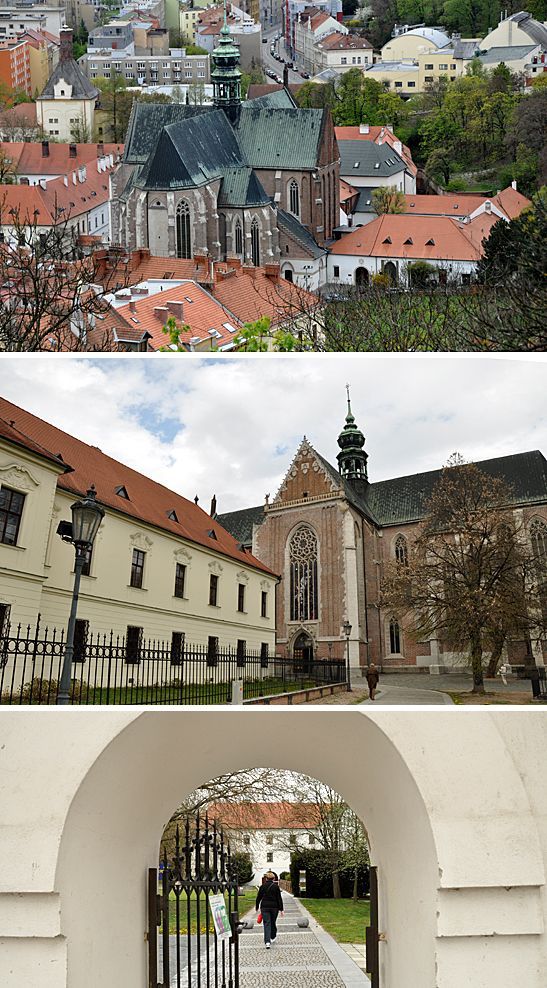
Mendel was indeed a capable and industrious student who learned easily and was curious about everything. However, the family crops failed over several years and his parents could not afford his studies. His father’s injury during forest work created more stress for Mendel but his steady character and diligence finally saw his acceptance as a 21-year-old novice into the Augustinian Abbey in Brno, the capital of Moravia (and now the second largest city in the Czech Republic).
The Augustinians arrived in Brno in 1346 and began building their cloister in 1352. It was their seat from 1356 to 1783. Joseph II, the Holy Roman Emperor, chose to evict the friars to obtain the abbey as a Habsburg administrative building. The Augustinians moved into the abandoned Cistercian convent, but Mendel, who had joined the order in 1843, continued his meticulous experiments on plants from 1856 to 1863 in the monastery garden.
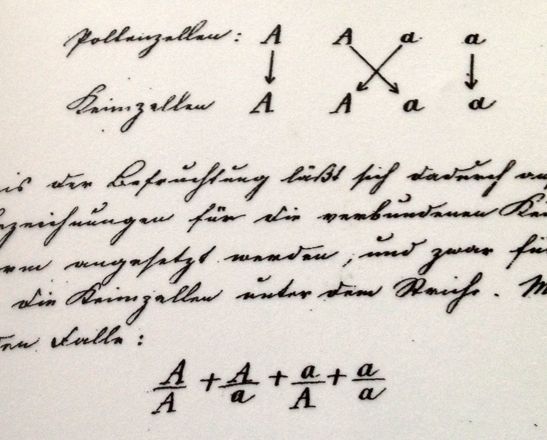
Mendel was not a simple man; he was well educated and continued his studies with great enthusiasm. He lived at a time when often the most literate of persons were found amongst the clergy, men who could read and write and had, for example, access to books. The monastery library contained 27,000 volumes.
Mendel’s interest in theology and his devotion to the church continued even as he studied agriculture, viniculture and meteorology. He completed two years study of natural science in Vienna, taught high school in Znojmo in South Moravia and became professor of physics and philosophy at the Realschule in Brno. He was an active member of the Brno Natural Science Society, the Society for Agricultural Developments and the Society of Beekeepers amongst other organizations.
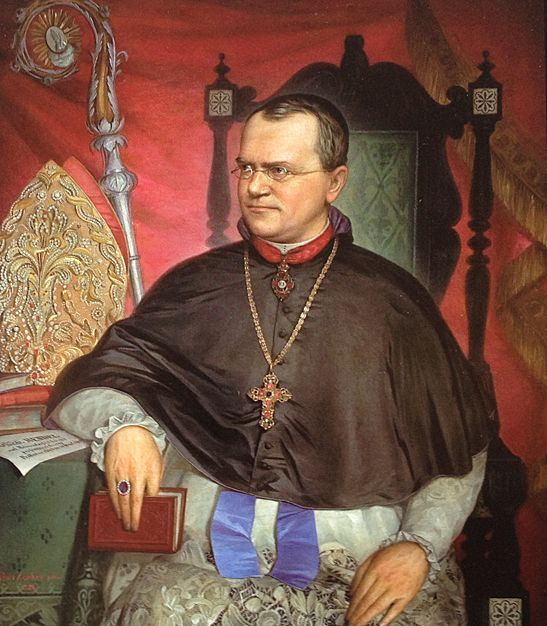
Mendel, of course, had the science and mathematical background to understand exactly what he was witnessing, but his work was not well recognized or acknowledged in his lifetime. However, he continued with his major interest, the church, and was appointed Abbot of The Old Town Abbey in 1868.
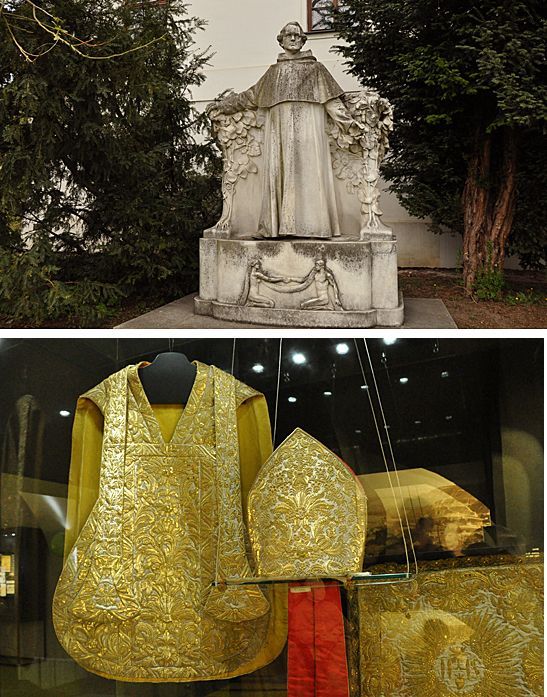
He is, of course, now remembered as the father of genetics. The principles he laid out from his experiments have remained a constant in this field. Beehives still have a place in the abbey and his original beehives occupy a spot in the entrance to the Mendel Museum.
The museum is quite new as museums go; it opened in 2001. The artifacts in it all belong to the Stare Brno Abbey, but, since 2007, Brno’s famous Masaryk University has been running the museum. The Mendel Museum organizes a series of annual lectures that is very high profile. This coming year four Nobel Prize winners will be among the speakers.
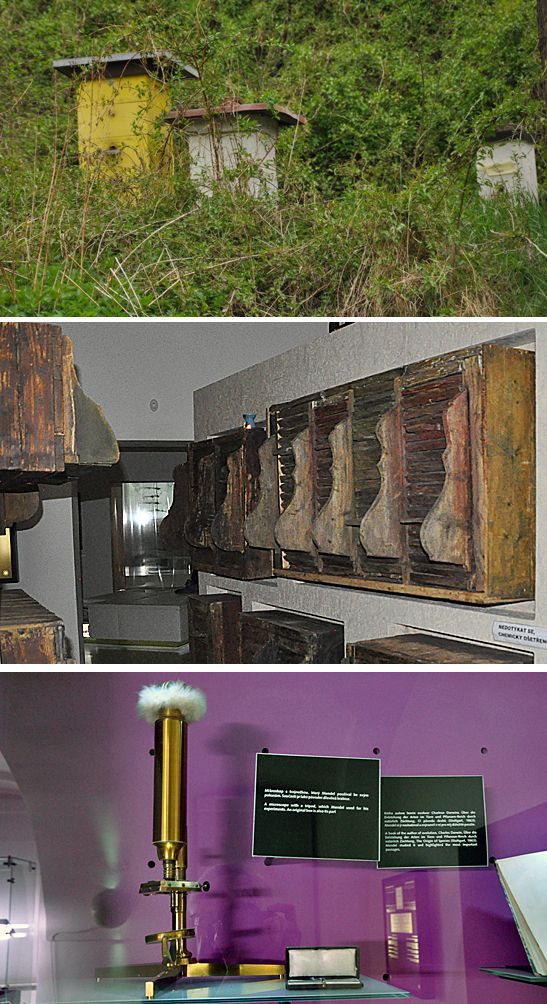
The museum is dimly lit to protect fading of the irreplaceable personal effects of this great cleric. He looks very much at peace in his portrait. A nearby display case exhibits the festive sacral robe, the chasuble and miter used by Augustinians.
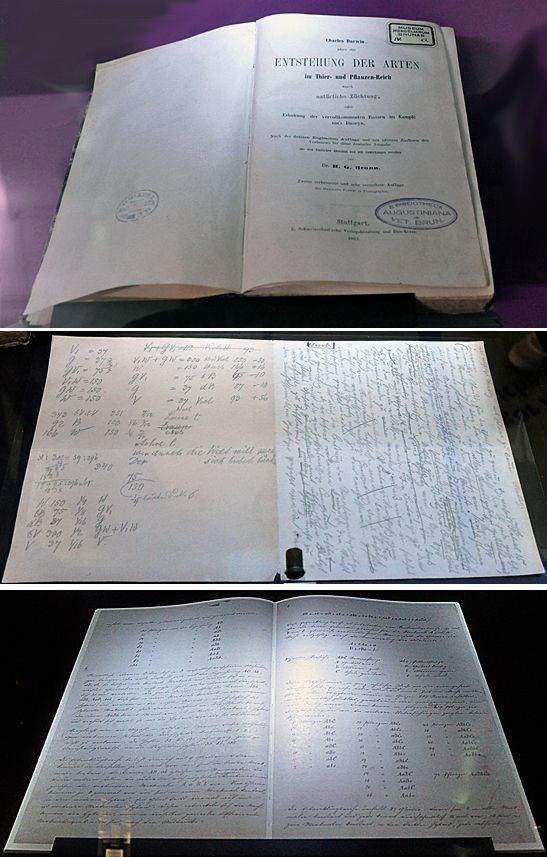
The Origin of Species
(Entstehung der Arten)
The museum shows his microscope, the instrument that surely contributed to the deterioration of Mendel’s eyesight. His eye glasses are there, too; a very special intimate part of his possessions. Books are there, of course, as he was a great reader. His personally notated copy of Charles Darwin’s published in Stuttgart in 1863 is on display along with notes on his experiments and drafts of his sermons
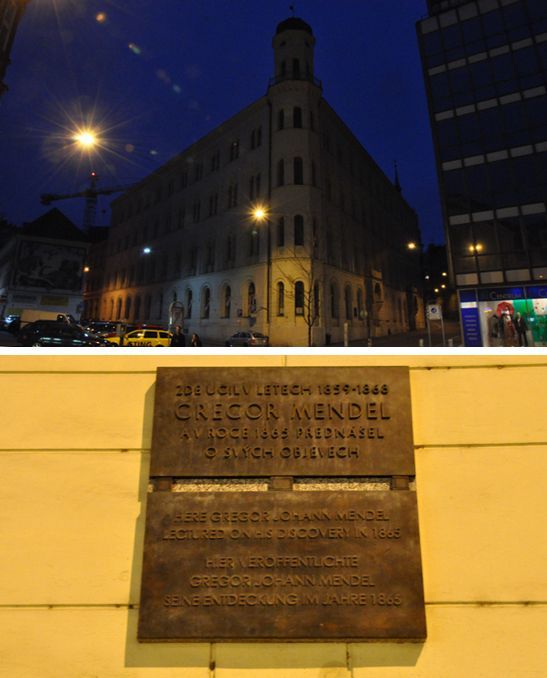
A short walk into downtown Brno brings visitors to the school where in 1865 Mendel presented his findings to members of the Brno Natural History Society —
who, apparently, had difficulties following and understanding his scientific experiments.
Mendel supposedly said “My time will come.” It has. His contributions to the field of genetics are now widely acknowledged.
“No doubt, the time of great development in genetics, of which Mendel is the father, has come,” says Abbot Martinec, the abbot of the Stare Brno Abbey. “But has ‘Mendel time’ come yet in this town? I believe we cannot wish for better conditions now. Now we are not forced to live in an ideological delusion saying that science does not go together with the Christian faith.”
The Man Who Cried Orange: Stories from a Doctor's Life.
The Andersons, who live in San Diego, are the resident travel & cruise columnists for Physician's Money Digest. Nancy is a former nursing educator, Eric a retired MD. The one-time president of the NH Academy of Family Practice, Eric is the only physician in the Society of American Travel Writers. He has also written five books, the last called
